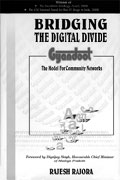Power of knowledge
Power of knowledge

In Madhya Pradesh, Mangal and Surshingh of Sarai village, go to the district administration at Dhar, several kilometres away, to lodge complaints against local services.
Sometimes, it is about a non-functioning tube well, a crumbling primary school building, housing 60 students, or the veterinary doctor who had no place to work or even the salesman at the fair price shop , who does not provide subsidised ration. Once, villagers who went to vote learnt that adversaries had deleted their names from the electoral roll and it was too late to do anything.
With the new community intranet network, called Gyandoot, villagers need not physically go to the district administration. At the click of a mouse, they know the village quota and stocks of sugar and kerosene actually received at the fair price shop or the export potential of Durram wheat or even information on cultivation of medicinal plants and floriculture. They also know whether their names are featured in the voters list.
Today, every second Gyandoot user in the village booth belongs to a below poverty line family, every sixth user is a woman and every seventh user is illiterate.
This book is about the author's experiment with the use of information technology to transform the lives of villagers in remote areas of Dhar in Madhya Pradesh, where he was an IAS officer.
The book covers the process from the conception of the idea and the installation of the system to its implementation and use by the villagers. It dwells on the problems and hurdles that were encountered and the technological solutions worked out. The Madhya Pradesh chief minister, Digvijay Singh, has written the book's foreword.







